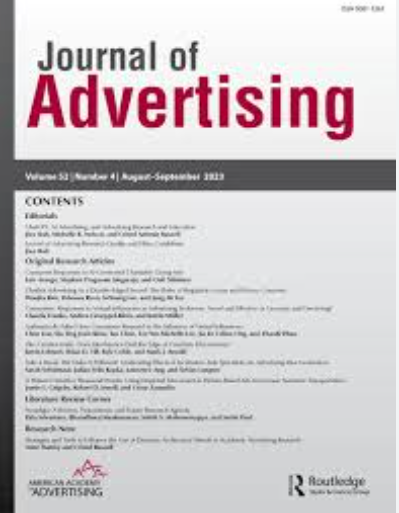Through the Partisan Looking Glass: Evidence of Asymmetric Credibility and Persuasion Effects of Unverified Negative Brand Information on Social Media
IF 7
2区 管理学
Q1 BUSINESS
引用次数: 0
Abstract
AbstractOnline disinformation often plays to partisan identities to grab attention and elicit strong reactions in polarized societies. In this research note, the perceived credibility and persuasiveness of unverified negative information about brands posted on social media and the role therein of congruencies among the partisan identity of the self, the source of information, and the brand (i.e., liberal versus conservative) are investigated. Following marketing research on “identity congruency” and “motivated reasoning” effects, three experiments demonstrate that self-source, self-brand, and source-brand partisan identity (in)congruencies can influence the credibility and persuasiveness of unverified negative brand information. However, the observed partisan identity (in)congruency effects were found to be asymmetric; that is, their nature or magnitude was dependent on whether liberal or conservative partisan identities were involved. This research note also emphasizes that unverified negative brand information posted on social media can have a substantial impact on brand evaluations, even if consumers doubt its veracity. These findings are relevant not only for advertisers (on social media) and brand managers but also for researchers who study online disinformation. It is hoped that this research note will lead to further research on the nature and drivers of asymmetric partisan identity (in)congruency effects in advertising and other communications contexts. AcknowledgementsThe author is grateful to the Editor, Associate Editor, and two anonymous reviewers for their suggestions to improve this research note. The author also thanks Negin Latifi, Sakshi Aggarwal, Sourjo Mukherjee, and Stefan Bernritter for their input, suggestions, and help with setting up and analyzing the results of earlier studies that informed this article.Disclosure StatementNo potential conflict of interest was reported by the author(s).Additional informationNotes on contributorsNiek AlthuizenNiek Althuizen (PhD, Rotterdam School of Management) is an associate professor, Department of Marketing, Sales, and Communication, Montpellier Business School.透过党派的镜子:社交媒体上未经证实的负面品牌信息的不对称可信度和说服效应的证据
在线虚假信息经常利用党派身份来吸引注意力,并在两极分化的社会中引发强烈反应。在本研究报告中,研究了社交媒体上发布的关于品牌的未经证实的负面信息的感知可信度和说服力,以及自我的党派认同、信息来源和品牌(即自由派与保守派)之间的一致性在其中的作用。继“身份一致性”和“动机推理”效应的市场研究之后,三个实验表明,自我来源、自我品牌和来源-品牌党派身份一致性会影响未经验证的负面品牌信息的可信度和说服力。然而,观察到的党派认同一致性效应是不对称的;也就是说,它们的性质或大小取决于是否涉及自由派或保守派的党派身份。该研究报告还强调,即使消费者怀疑其真实性,社交媒体上发布的未经证实的负面品牌信息也会对品牌评价产生重大影响。这些发现不仅适用于(社交媒体上的)广告商和品牌经理,也适用于研究网络虚假信息的研究人员。希望本研究报告将导致对不对称党派认同在广告和其他传播环境中的一致性效应的性质和驱动因素的进一步研究。作者感谢编辑、副编辑和两位匿名审稿人为改进本研究笔记提出的建议。作者还感谢Negin Latifi、Sakshi Aggarwal、Sourjo Mukherjee和Stefan Bernritter的输入、建议和帮助,他们建立和分析了本文所依据的早期研究结果。披露声明作者未报告潜在的利益冲突。作者简介:niek Althuizen(鹿特丹管理学院博士),蒙彼利埃商学院市场营销、销售和传播系副教授。
本文章由计算机程序翻译,如有差异,请以英文原文为准。
求助全文
约1分钟内获得全文
求助全文
来源期刊

Journal of Advertising
Multiple-
CiteScore
11.20
自引率
10.50%
发文量
55
期刊介绍:
The Journal of Advertising is the premier journal devoted to the development of advertising theory and its relationship to practice. The major purpose of the Journal is to provide a public forum where ideas about advertising can be expressed. Research dealing with the economic, political, social, and environmental aspects of advertising, and methodological advances in advertising research represent some of the key foci of the Journal. Other topics of interest recently covered by the Journal include the assessment of advertising effectiveness, advertising ethics, and global issues surrounding advertising.
 求助内容:
求助内容: 应助结果提醒方式:
应助结果提醒方式:


